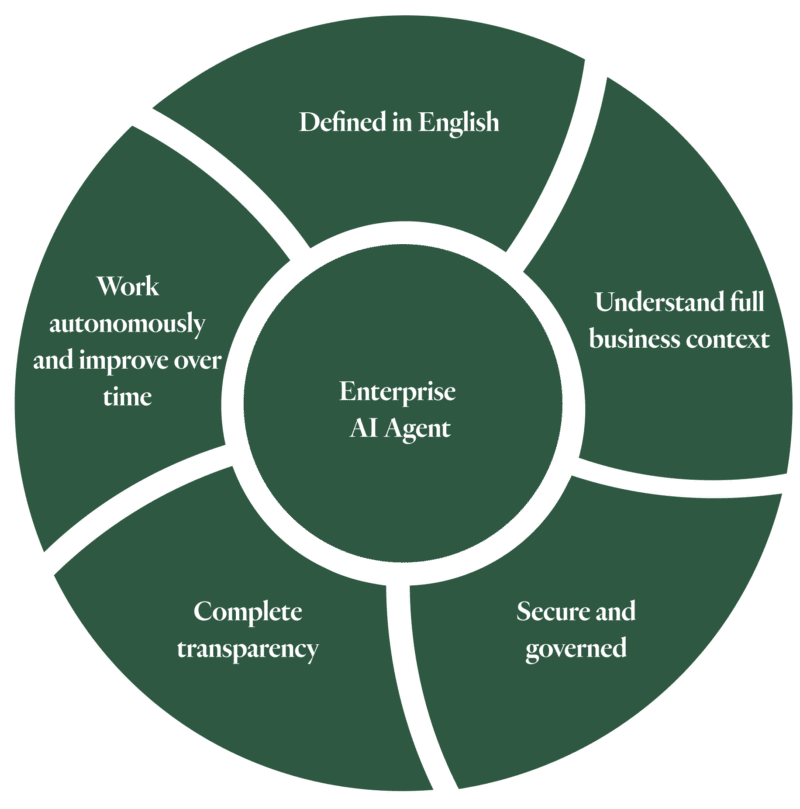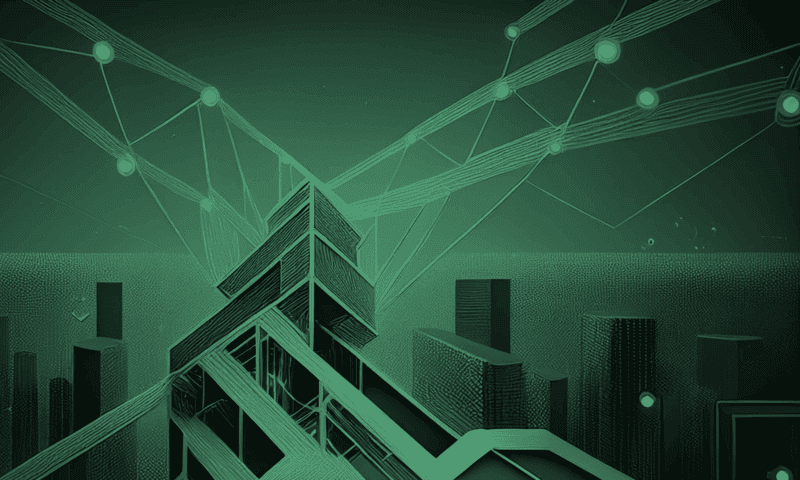Enterprise AI Agent – The Future of Knowledge Work
Even after a decade of cloud transformation and many more decades of business apps, we all know that the world still runs on ad-hoc processes, spreadsheets, and manual human effort. No effort so far, whether focusing on technology or organizational change, has been able to change this, and the world keeps on running on manual digital work.
Enterprise AI agents are here to change that. They are the future of business applications that are infinitely more flexible and adaptable than anything before them. This allows enterprise agents to address work that has been only possible with humans so far, work that requires making connections between multiple systems and data silos and communicating flexibly across teams.
Five defining characteristics of an enterprise AI agent

Since the introduction of ChatGPT, advancements in large language models have fueled an explosion in AI technology. Now, we have emerging categories of AI applications such as chatbots, copilots, RAG systems, and, most importantly, AI agents.
AI agents are set to become as ubiquitous in our everyday lives as the internet and the smartphone. For software developers, using agents is already an everyday utility. The same applies to increasing numbers of writers, marketers, and even lawyers. Soon, every customer service interaction will be handled by AI agents that respond to your call immediately and handle your every request accurately and patiently. We will quickly learn to prefer and expect that interaction over waiting in line for hours and getting bounced between different departments.
This same level of expectation and improvement applies also to business operations. Agents help companies automate their internal processes, whether in finance, logistics, or compliance, in previously unthinkable ways. This type of agent is called an enterprise AI agent, and it thrives in the complex and unique environments of large enterprises and excels at custom knowledge work.
Enterprise agents specialize in the type of work that makes your company you. This type of work is one that nobody else from the outside can claim to understand better and where pre-canned solutions are not a fit.
Building and operating enterprise agents comes with a unique set of requirements and challenges. Here are five key characteristics that set enterprise agents apart from other AI solutions and make them effective at their work.
1. Defined in English by business users for business users
The power of enterprise agents lies in their ability to be shaped by those who possess the most profound understanding of how the company operates: line-of-business experts. This is why enterprise agents are defined and instructed in English rather than code. This fundamental principle ensures that control remains firmly in the hands of line-of-business experts, empowering them with the agility to adapt to changing needs without constant reliance on developers or IT departments.
At Sema4.ai, we call this capability the Runbook. It’s the first point of interaction for creating, updating, and improving agents. Runbooks are written in a way that you would use to describe the work to a colleague and map out the tasks, goals, and business rules of the agent. They closely resemble a Word document instead of a programming tool.
2. Understand the full business context, including applications, data, and documents
Enterprise agents need to be more than just intelligent; they need to be contextually aware of the intricate workings of a business. This means seamlessly integrating with your enterprise technology stack—from legacy applications and databases to the latest cloud-based solutions.
Enterprise AI agents represent a new layer of applications that sit atop existing enterprise systems, including applications, systems of record, data warehouses and lakes, and unstructured documents. An effective enterprise agent has to be capable of accessing, interpreting, and acting upon these without extensive modification, while respecting and adhering to an organization’s security and access policies.
An enterprise agent adapts to your unique work, systems, documents, and data, not vice versa.
3. Work autonomously and improve over time through feedback and training
Most AI systems we see today are based on a chat interface. To truly unlock their potential and achieve significant efficiency gains, enterprise agents cannot always rely on human users. They have to operate autonomously when the work calls for repetition. This capability extends beyond simple rule-based automation to true knowledge work. An enterprise agent should execute complex, multi-step processes and handle high volumes of transactions independently, around the clock, without requiring constant human intervention.
This autonomous nature is exemplified by worker agents, a type of enterprise agent that Sema4.ai powers. Worker agents operate independently, processing transactions initiated by triggers such as emails, new documents, or scheduled tasks.
For instance, an invoice reconciliation agent can process invoices from emails or file storage according to its runbook as new documents arrive. Using document intelligence, this agent understands the invoice document, interacts with ERP systems, references contracts, and determines if the invoice can be approved for payment. If the agent encounters a discrepancy, it will investigate the issue and escalate the invoice to a human supervisor.
Importantly, an enterprise agent’s learning doesn’t cease once deployed. Enterprise agents are designed for continuous improvement. They learn from interactions, incorporate user feedback, adapt to new information and changing business environments, and evolve alongside advancements in AI technology, ensuring that your investment remains future-proof.
4. Full transparency and explainability of reasoning and actions
In the world of business operations, trust is paramount. And that trust hinges on transparency, especially when we entrust critical tasks such as finance approvals to an AI. Black box solutions are not an option for enterprise agents. Every action and step taken by an agent must be auditable and explainable.
Enterprise agents must provide auditable trails that clearly outline their decision-making processes, the rationale behind their actions, and the data used to arrive at a particular conclusion. This level of transparency is also critical for ensuring compliance with regulatory requirements and internal governance policies.The key enabler of this explainability and transparency is the reasoning engine that powers enterprise agents. It is also the component that controls what information and systems the agent can and cannot utilize in its decision-making and what type of guardrails control and limit the agent.
5. Secure and governed from inception to production
Even before the safety and explainability of an agent’s reasoning, we must always start with system-level security. Enterprise agents frequently handle sensitive business information, making security and governance non-negotiable aspects from the outset.
Every stage of an enterprise agent’s lifecycle, from its initial design and development to its deployment and ongoing operation, must adhere to strict security protocols. This includes robust access controls, data encryption, and adherence to industry-specific compliance standards to safeguard data and ensure responsible AI usage.
Enterprise agents operate as digital employees with access to sensitive information and systems. It is vital to operate them within a tightly monitored environment with well-defined controls, access policies, and boundaries throughout their entire lifecycle.
The future with enterprise AI agents
Enterprise AI agents are set to revolutionize our work. While initial changes may be subtle, their impact will grow rapidly, reshaping our expectations beyond recognition in just a few years. At first, agents only communicate with humans and work on individual tasks, but over time we can expect to have agent-to-agent interactions and networks of agents taking over entire business functions.
Human experts will guide this evolution, providing instructions in plain English and offering feedback on complex scenarios. Leveraging AI allows knowledge workers to 10x their output, maybe for the first time since the invention of the software spreadsheet.
Follow Sema4.ai or contact us to learn more about enterprise agents and explore how to start working with your first AI knowledge worker.


